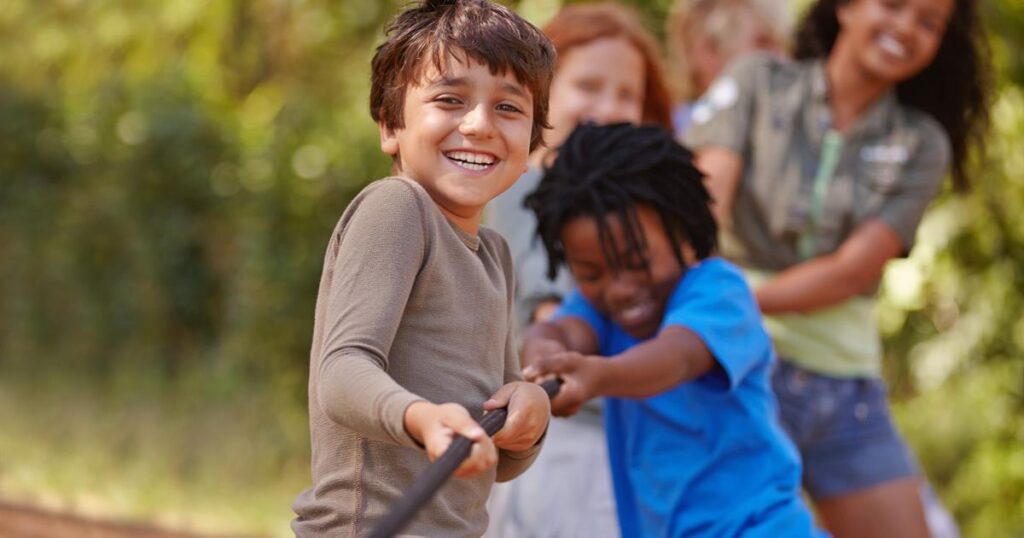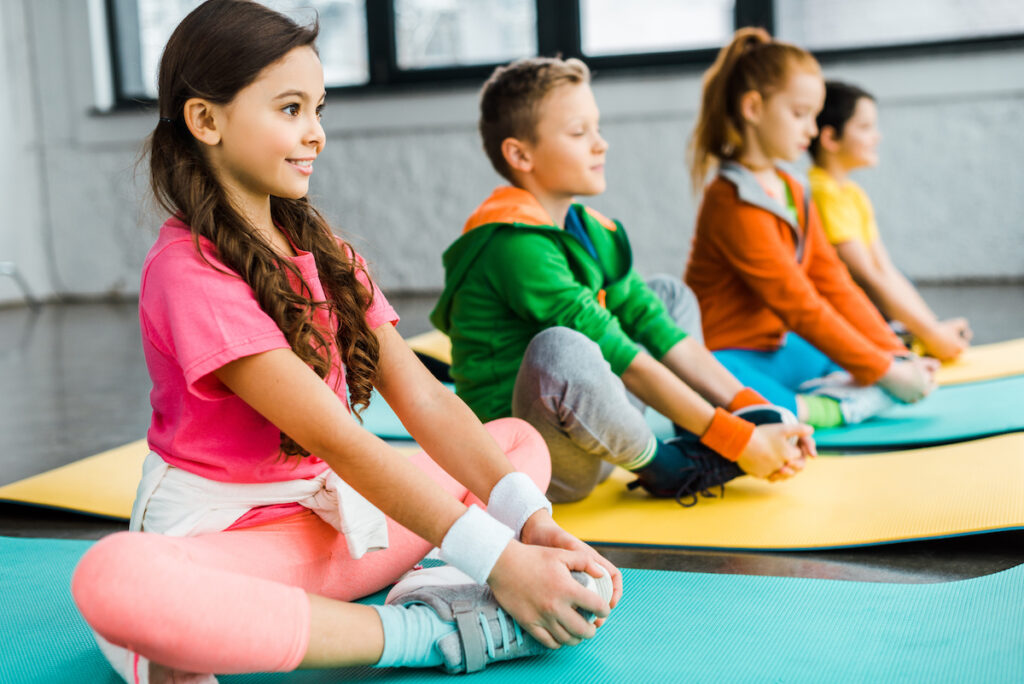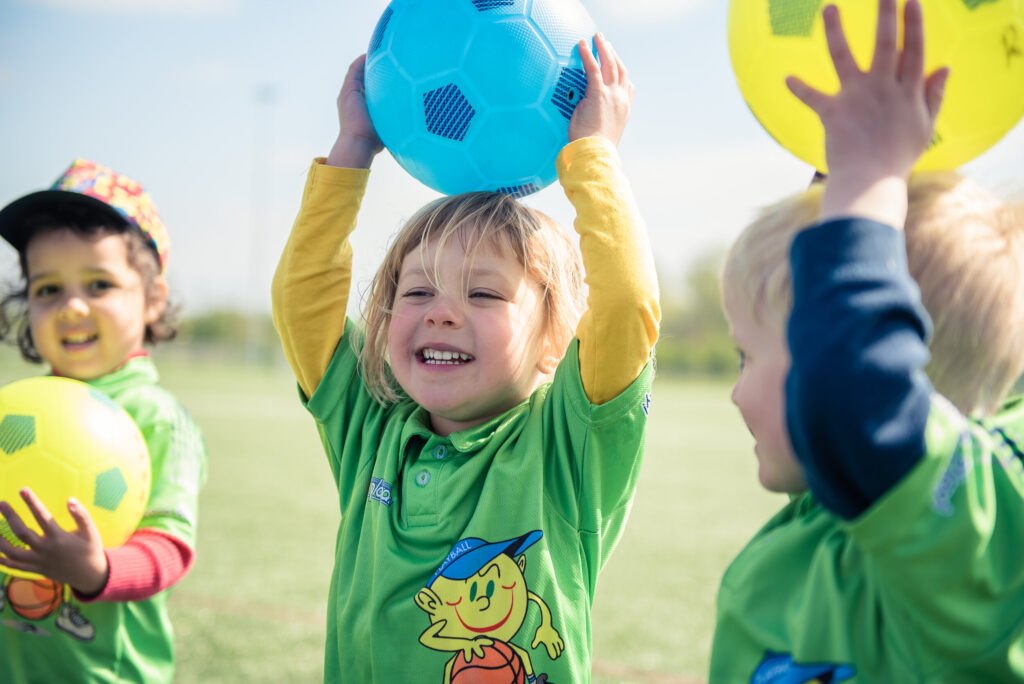
Academics and sports – it’s been an age-old tussle as to which is more important in a child’s life. Sadly, most children are forced to study even at times when they should be out playing with their friends.
A significant reason for sports being given a second-grade status is that academics is seen as the only route to a successful and comfortable life. However, it is also because many people fail to see the benefits of sports, especially for a growing child.
There is more to sports than just improving physical fitness. Regular participation in sports and games helps children learn new skills, builds confidence, self-discipline and so much more.
Let’s take a closer look at some of the benefits that your child gains from giving equal importance to sports and academics.
1. Boosts Self-Confidence

Sports bring out latent confidence even in the case of a shy child.
Just imagine – a shy child sitting in class may hesitate in standing up and giving the right answer for the simple reason that the spotlight comes on them.
Imagine the same child who is faced with taking a decisive penalty kick for his team to win. In the first scene, the child gets no motivation to stand up and answer. In the second case, he gets motivated by the team behind him and if he does score the penalty kick, his confidence soars to a new high.
Life skill achievement: A 2016 study (1) noted that “participation in sports has many positive effects on children’s health, education and behavior: overall, children’s school grades and behavior, in particular the relation to their peers, improve substantially.”
2. Teamwork Benefits

This brings up the second reason which is summed up by the line – “There is no I in team”. Win or lose, the entire team faces it as one.
Even if the child misses the penalty kick in the above scene, no team ever lets one of its players bear the brunt of defeat alone. Such is the beauty of team sports.
Playing one sports tournament together as a team can be more rewarding than working on a year-long academic project.
Life skill achievement: Researchers (2) have revealed that “Team sports “exposes children to cooperation with other children in a team, which may make them better team players also in other situations in life and, thus, may explain the reduction in peer problems.”
3. Instills Discipline

Any child who has been a part of a sports team would agree on the rigors of coaching that go with it.
Punctuality in attending coaching sessions, following instructions to the letter, obeying the rules at all times, and learning to control their emotions even, in the most difficult of situations – all these traits come good in shaping the character of children and help them face real-life situations in their future.
Life skill achievement: Continuous regular physical activity over several weeks is confirmed to have significant positive effects on executive functions, attention, and academic performance of children (3)
4. Learning Patience and Perseverance

No other activity shows the benefits of patience and perseverance like sports does.
Scoring a goal in football from a well-worked 20 touch pass or scoring a last-minute winner is the stuff that transforms children into heroes. Every player is drilled over and over into patiently giving his best right until the last minute of the game.
No matter how many setbacks are faced by a team, each member of the team is coached into fighting till the end without giving up.
Life skill achievement: Sports help create a positive attitude towards life and its struggles (4).
5. Accepting Defeat Gracefully to Rise Even Higher

This is something most children never learn properly in their childhood. Almost every parent or teacher prides in relentlessly pushing their children to gain success. However, we never equip them to deal with failure.
Failure is a realistic situation that every person in the world faces at some time or the other. How a person comes out of that failure will define how high he/she will reach in life.
Sports, owing to the quick result format, equips children to deal with success in a levelheaded manner and also not to lose their morale when faced with defeat.
Life skill achievement: According to research (5), “Victory in competition may raise children’s self-esteem while defeat, despite eventual negative effects on children’s self-esteem, may teach them how to deal with such a situation.”
6. Honing Leadership Skills

“Cometh the hour, cometh the hero” is a phrase that fits sports like no other. Every sport brings out situations where children’s inner spark of leadership is lit.
A leader must learn to bring out the best in the people around him and ensure that the morale is never down. At the same time, it is equally essential to ensure that authority figures are obeyed and respected.
Life skill achievement: With team sports, the child learns to lead different people, from all walks of life, towards a common goal/objective (6).
7. Mind and Body Health Benefits

It goes without saying that participating in sports activities helps groom a healthy body. Furthermore, a healthy mind exists only in a healthy body.
Thus, making sports a regular part of life has the dual benefit of keeping a child’s mind and body healthy.
It helps prevent or overcome childhood obesity and stay fit. Games such as recreational football improve muscular and cardiorespiratory fitness in overweight or obese adolescents (7).
Life skill achievement: Research (8) confirms that “engaging in sports in late childhood positively influences cognitive and emotional functions.”
8. Developing Social Skills

Sports give children ample opportunities to mingle and get to know new people of all ages. When compared to a classroom, social boundaries are less rigid on a sports field.
Friendships formed on a playing field while playing on the same team are sometimes no less than friendships formed on the battlefield and often turn to lifelong friendships.
Life skill achievement: As stated in the Open Access Journal of Sports Medicine (9) “Sport provides a medium for physical activity, developing friendships, and learning developmental skills across all domains.”
9. Boosts Happiness and Mood

It is proven that active physical participation in sports results in releasing beta-endorphins and serotonin into the body, both of which help to bring happiness and uplift the mood in a person (10).
Life skill achievement: Anxiety, depression, and other mental health conditions are prevalent worldwide. The positive mental health effects of exercise will help you overcome depression and discover your true and happy self (11) (12).
10. Discovering New Careers

Some kids may not be academically brilliant but they would be a real bundle of talent on the sports field.
With the right guidance and support, these kids can build their own careers in the sports field. And in many cases, their careers may turn out to be more rewarding and lucrative than academic careers.
Life skill achievement: As published in the International Journal of Sports Physiology and Performance (13) “The theory of deliberate practice postulates that experts are always made, not born. This theory translated to the youth-sport domain means that if athletes want to be high-level performers, they need to deliberately engage in practice during the specialization years, spending time wisely and always focusing on tasks that challenge current performance.”
At the same time, it’s important that parents and teachers be aware (14):
“For most sports, there is no evidence that intense training and specialization before puberty are necessary to achieve elite status. Risks of early sports specialization include higher rates of injury, increased psychological stress, and quitting sports at a young age.
For most sports, such intense training in a single sport to the exclusion of others should be delayed until late adolescence to optimize success while minimizing injury, psychological stress, and burnout.”
Before You Go…
It has been proved, scientifically and otherwise, that sports is now to be treated on an equal footing with academics in the life of children. And even if you don’t find any of the above reasons plausible enough, I suggest that you still let your kids have fun and try their hand at sports – they will thank you for it!
Considering the relationship between sports participation and health-related quality of life, it is scientifically proven (15) that “frequency is more relevant than the form of sports participation, children should be encouraged to perform any kind of sports activity on a very regular basis”.
